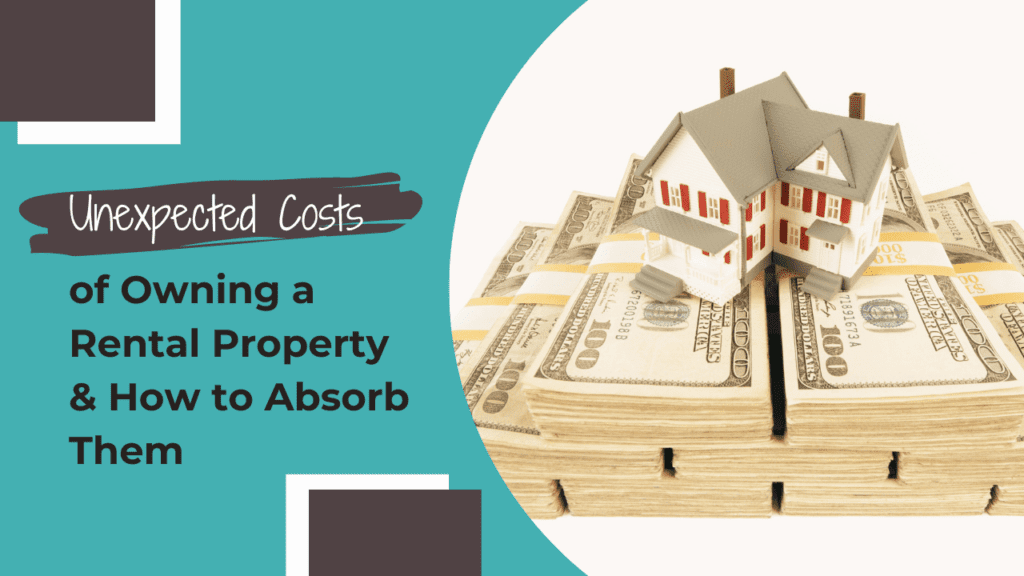
When you’re preparing to rent out a property, you put together some estimates on what you expect you will earn and what you expect you will spend.
The numbers don’t always add up, unfortunately.
There are the expenses you know are coming, and you almost always know how much you’ll have to pay. The mortgage is a certain amount every month and you can be sure of what you’ll pay in taxes and homeowner’s insurance premiums.
The variable expenses can be way outside of your anticipated range, and that’s a shock. Sometimes, you’ll have costs that you weren’t even anticipating.
Let’s take a look at some of the unexpected costs of owning a rental property. We’ll also provide some insight on how to absorb those costs so your entire budget isn’t thrown off track.
Can You Ever Anticipate Inflation?
In some ways, rising inflation has been good for rental property owners. It’s one of the reasons you’re likely collecting more rent than you were a year or two ago.
But, it’s also turning up as an expense. You might not have planned ahead for inflation this high. Everyone is feeling it. We are paying more for the goods and services we rely upon. Housing is no exception, nor is the business of providing housing. If you’re renting out a property anywhere along the Gulf Coast in Florida, you know that the cost of doing business is going up.
Insurance prices are going up, and you’re paying more for maintenance, landscaping, cleaning, and professional services.
Inflation isn’t something most property owners budget for. But, as you begin to think about next year’s budget, consider that you may need to increase what you have set aside for those monthly bills and necessary services.
What You Pay for Vacancy
One of the costs that’s easy to forget or underestimate is the cost of vacancy.
Vacancy hurts because it snowballs. Having an empty home for one week can cost you several hundred dollars. When your rental property is vacant for two weeks, you start thinking about the thousands of dollars you’re losing in rent.
You have to plan for this eventual expense. Even with outstanding retention and strategic marketing, your Florida rental home will probably not be occupied by tenants all of the time.
Sometimes, vacancy is by design. You’re making improvements or taking care of large maintenance needs. That’s easy to plan and budget for. Those unexpected vacancies, however, are especially painful and expensive. When you’re trying to lease your home but you can’t seem to attract tenants, you’re watching your cash flow and your ROI slip away. Maybe the market has shifted and there’s a lot of competition. Maybe the economy is suffering and tenants are staying in place, so there’s not a large pool of renters looking for homes.
Whatever the reason for your vacancy – it’s easy to feel blindsided when you cannot rent your home.
Anticipating Turnover Costs
Unless a tenant has broken a lease and moved out unexpectedly, you have plenty of time to plan for your turnover period and the loss of rent that you’ll suffer while the home is empty between two tenants.
But, you never know how much you’ll have to spend to get the property ready for a new resident.
Usually, turnover costs are even more expensive than vacancy, and the cost of a turnover can be a shock to a property owner. When one tenant moves out, you’ll have to invest in cleaning and preparing the property, and then you’ll have to advertise and market it.
Plan on having a full month of vacancy between tenants. Even if the vacancy isn’t that long, by budgeting for that time period, you will have more flexibility when you’re making updates and upgrades.
How Much Will You Spend on Problematic Tenants?
You might be surprised at what a bad tenant can cost. When you have a robust screening process in place and you try your best to establish a good relationship with your tenants, those costs associated with tenants are always unexpected.
But, this does happen, and even if you’re confident in your screening process and your tenant relationship, you’ll need to be prepared for the expenses that can arise due to:
- Property damage. You might find more damage than the security deposit covers at the end of a lease term.
- Late rent. This will set you back financially and require you to spend more time than you’d like collecting payments.
- Unpaid rent. You’ll need to send notices and potentially file for eviction in court.
- Lease violations. A pet you didn’t approve and didn’t collect a pet fee for might tear up your floors or attack a neighbor.
When a tenant is not performing the way you expect them to, you’ll find yourself spending more time and money than you’d like on lawyers, court fees, evictions, maintenance, cleaning, and renovations.
Eviction Costs are Often Feared but Never Expected
Eviction should always be a last resort. Even if you have a difficult tenant who is not paying rent, there may be a way to get them to move out before you have to take them to court. This will save you from the shock of what it actually costs to evict your tenant.
Many owners are surprised to find out what it costs to evict or otherwise remove a tenant who isn’t paying rent or not following the lease. You’re missing a lot of rental income when you have to evict, and there will be additional court fees even if you are successful in evicting a tenant.
It doesn’t even have to be an eviction to create a sudden and expensive cost for you as a rental property owner. You might have a tenant who does not pay rent for two months and after all your notices and the official filing for eviction, the tenant will move out before it goes to court. That’s still a lot of rent you haven’t been able to collect, and there’s no telling what the property will look like when you get inside.
Deferred Maintenance in Florida Rental Homes
We have been managing rental properties across central Florida and on the Gulf Coast for many years, and in all that time, we have never seen a maintenance problem get cheaper by being ignored.
Those problems, instead, will get more expensive. It’s easy to be surprised by the cost of those deferred repairs that seem like no big deal.
Don’t wait to make a repair. When a tenant reports that something is wrong, evaluate it right away. It doesn’t take long for a slow drip to become a plumbing disaster. Invest in routine inspections and service calls. Have your HVAC system checked, your roof looked at, and your windows upgraded to hurricane-proof quality panes.
These investments will save you money in the long term. There will be fewer emergency repairs called in and lower expenses overall.
How to Absorb the Unexpected Rental Property Costs
Now that you know that these unexpected costs are out there and likely very difficult to avoid, how can you make room in your budget to absorb them?
- First, you need to over-budget. When you set aside more money than you’re likely to need, you will rarely be surprised by how much something costs. Saving 10 percent of your monthly rental income for maintenance needs, for example, will help you set up a nice reserve. You probably won’t use that money every month. But, you’ll have it set aside when an unexpected repair shows up. You can use it as a buffer if a vacancy is longer than you expected.
- Property management is another important step to take when you’re trying to absorb unexpected costs. That’s because property managers anticipate everything. They know when things in your property will need to be repaired or replaced. They know how to distinguish a bad tenant from a good tenant. They have a process in place for evictions, and they can help you budget for inflation.
- Finally, try to understand the life expectancy of small things like paint and large things like your roof. When you know how long you can rely on something to last, you can budget for those repairs and replacements over time. Talk to your HVAC service technician, who might tell you that your air conditioning unit is going to last 15. When you know that, you can see the large replacement expense coming as you approach year 15. With any system or appliance, you know you’re getting lucky if 10 years have come and gone and you haven’t needed to repair or replace it yet. You don’t want to rely on luck, however. Make a budget.
 Providing a safe, habitable home that tenants are eager to rent is more expensive than it sometimes seems. You need to be prepared for these unexpected costs. If you’d like some help making plans for how you’ll budget and address these costs, please contact us at Anchor Down Real Estate and Rentals.
Providing a safe, habitable home that tenants are eager to rent is more expensive than it sometimes seems. You need to be prepared for these unexpected costs. If you’d like some help making plans for how you’ll budget and address these costs, please contact us at Anchor Down Real Estate and Rentals.
